“There are no shocks on this album. I like bands to stay true to the sound that works. I’m happy that AC/DC have been making the same record for 50 years” Kerry King on his unapologetic solo debut – and how long before Slayer jump back into the coffin
As one half of Slayer’s fearsome guitar attack, Kerry King shaped the sound of extreme metal. With a new album and a new sparring partner, he hasn’t mellowed…
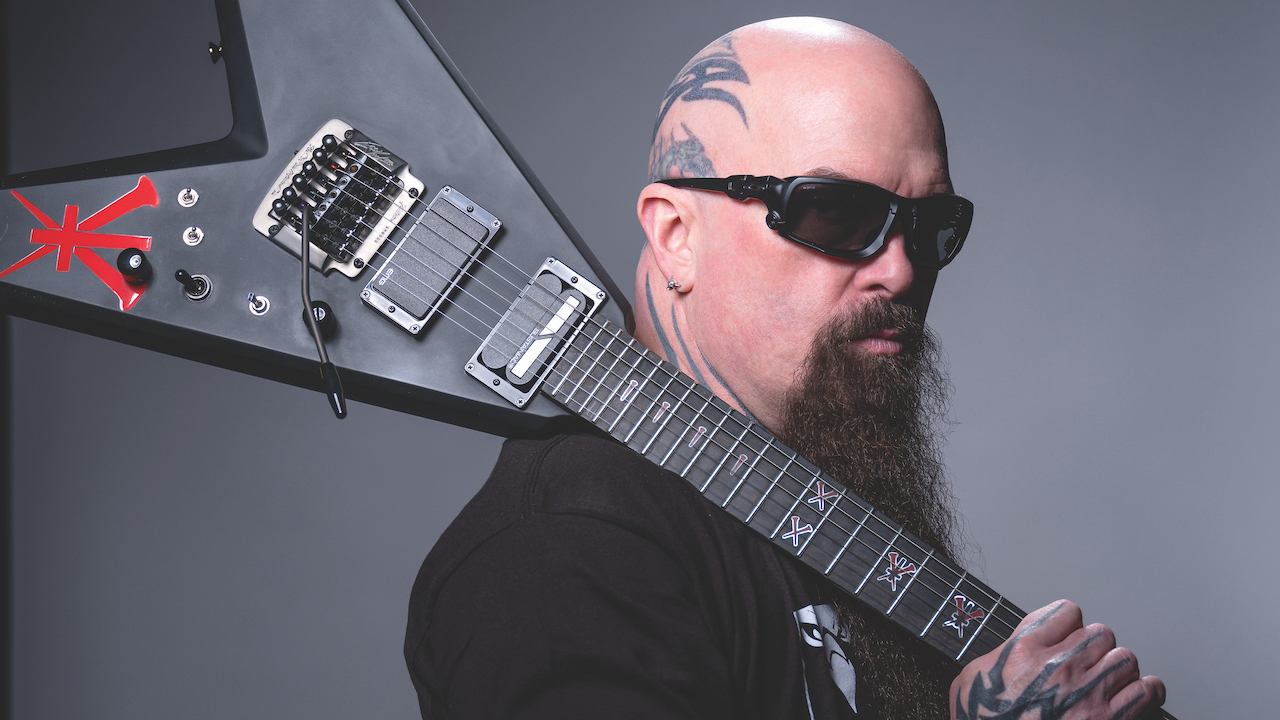
All the latest guitar news, interviews, lessons, reviews, deals and more, direct to your inbox!
You are now subscribed
Your newsletter sign-up was successful
Kerry King’s no-nonsense approach to creating razor-sharp, life-affirming heavy metal has made him one of the world’s most influential players. His work in Slayer with co-guitarist the late Jeff Hanneman set the benchmark for a new kind of murderous noise – sounding thicker and angrier than anything before it.
As pioneers of thrash metal in the early ’80s alongside Metallica, Megadeth, Anthrax, and a host of other speed-fuelled bands, Slayer would lay the groundwork for the varying waves of metal that followed.
When Slayer announced their retirement and played their final show in 2019, Kerry was certainly vocal about not being happy with the decision. “We quit too early,” he reflected. “I hate not playing.” But now he’s back on the horse and doing what he does best, writing riffs heavy enough to knock the earth off-axis to create From Hell I Rise – the debut offering from a new band under his own name.
Before we get to the music, however, we need to address the elephant in the room. Only weeks after Kerry officially announced his comeback, Slayer were confirmed to be headlining US festivals later in the year. Few could have predicted things turning out like this, including the guitarist himself...
“It caught me off-guard, too!” he admits. “Do I wish the timing was different? Absolutely, but that’s completely out of my hands.”
Either way, don’t get your hopes up about a full-scale Slayer reunion. Kerry leaves no room for doubt in his explanation of where the band see themselves in 2024.
“Everyone thinks Slayer are getting back together but that couldn’t be further from the truth,” he says. “We’ve been turning down gigs ever since we stopped. This one came and I thought, ‘If we’re ever going to do one, this could be cool because it’s the five-year anniversary of our final tour.’
All the latest guitar news, interviews, lessons, reviews, deals and more, direct to your inbox!
“We’re not going to record anymore. That final tour was definitely our final tour. This is just a reason to have some fun the guys, play a few shows and then jump back in the coffin…”
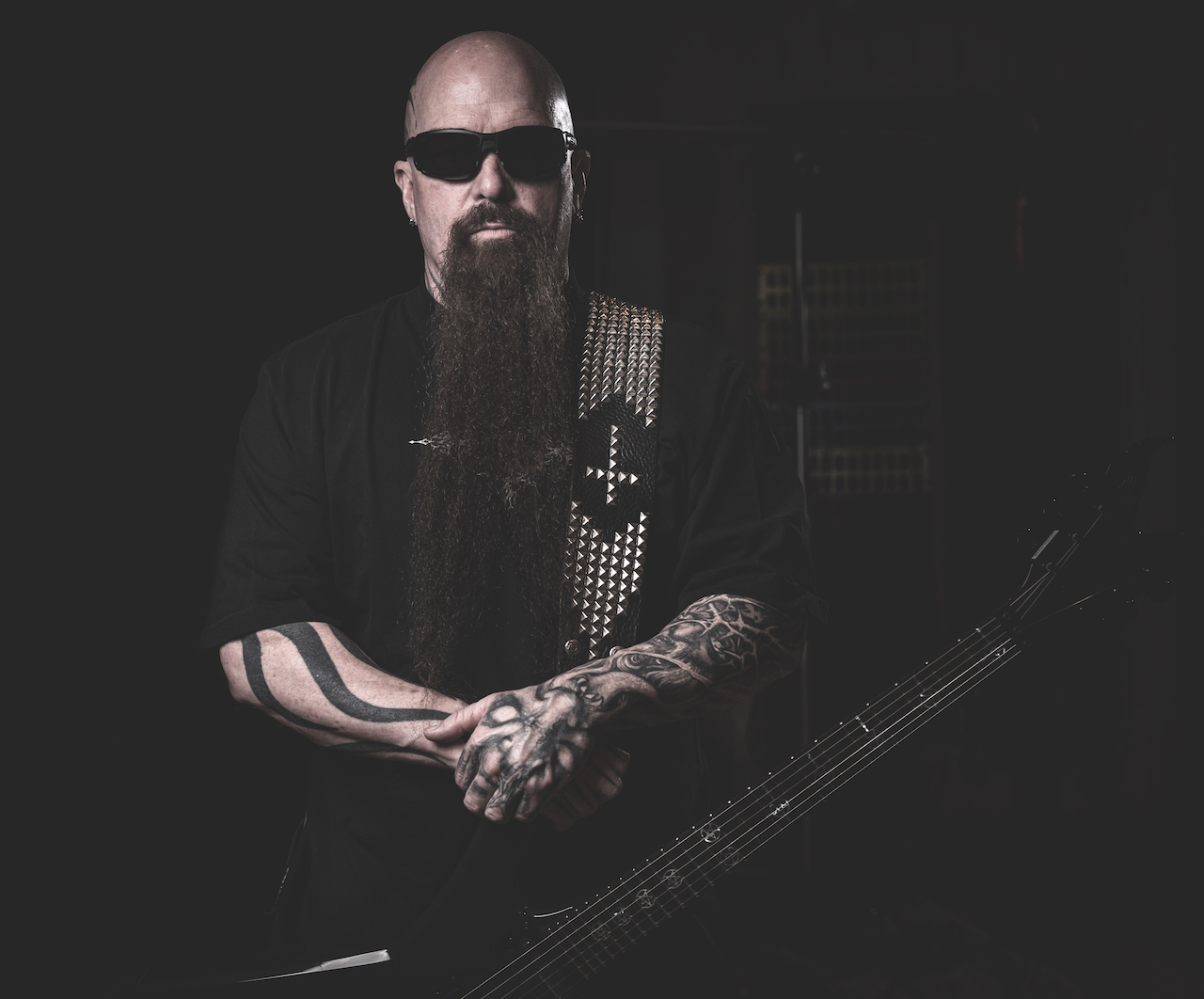
The other big news is your new partnership with Dean. It came as a surprise, given how loyal you’ve been to B.C. Rich since Slayer’s earliest days…
“With any of the companies I’m with, I’m super-loyal, and I’d become friends with all my B.C. reps. But the company got sold to people who didn’t have the same agenda. It was time for me to get out.”
Do you still favour a Sustainiac in the neck and an EMG 81, with a PA2 Preamp Booster, in the bridge?
“The boost is a carryover from the way I’ve been playing for the last 20 years or so. It’s just comfortable for me to have it there. If there’s a funny-sounding stage or a situation where I need an extra kick, I’ll use that preamp boost. I was using it for my leads but now I’ll kick in my MXR Zakk Wylde Overdrive.”
You’ve been a Marshall diehard over the years. Is that what we’re hearing on the new album?
“Yeah, I used my signature ‘Beast’ Marshall heads which come with a built-in thing called the Assault, based on my signature MXR 10-band Graphic EQ parameters. They just put it into a knob where you could get more or less of it, working like an overdrive. And for serious gain, it has a noise gate.
“I like the way they sound going through Marshall Mode Four cabinets – there’s a lot of low-end girth. The heads sound different going through a regular 1960 cab. When I was doubling, I would change guitars and heads, just for variety.”
Digital gear, particularly plugins, has really taken off since you last released an album. We can’t imagine you plugging into a laptop because of the lack of air moving, but have you ever tried it?
“When we did the last Slayer album, Gary Holt was using his Kemper for the solos. Phil Demmel, who is playing with me in this new band, used something digital on this album.
“I don’t know what it was. I haven’t been pushed to the point of trying that stuff. Like you said, I want air moving. Is it more difficult towing real amps from country to country? Abso-fucking-lutely. But I haven’t found anything to match that. And if it ain’t broke…”
What do you look for in a riff? Is there anything you tend to rely on?
“One thing that sticks out is my choice of chords and rhythmic patterns. I attribute a lot of that to Judas Priest, because they would write riffs that went from A to F and C, with icing here and there. And I think my go-to is more like E to F and G, or maybe G#. That idea turns up in most of my riffs. I don’t try to change that, it’s just where I end up.
“I probably base too many songs on that kind of progression, but most people probably don’t notice! There are no shocks on this album. I like bands to stay true to the sound that works. I’m happy that AC/DC have been making the same record for 50 years. That’s why I like them!”
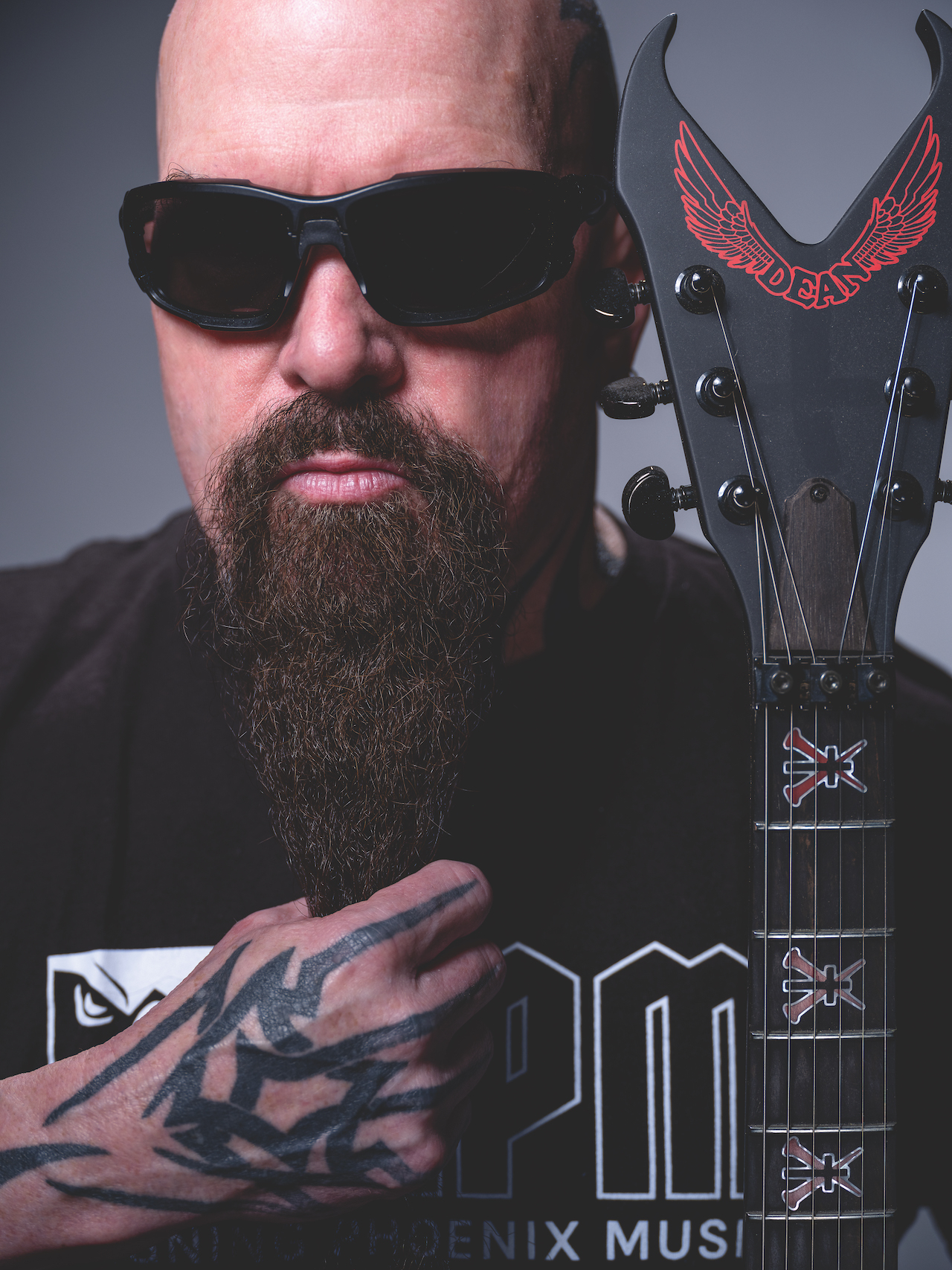
Crucifixation is one of the faster tracks. How did that come about?
“Yeah, it’s pretty quick. The one that gave me the most trouble, which has actually been around since the last Slayer album, is the title track. If you’re not warmed up, you’re not getting anywhere near that opening riff.”
How exactly does one master the skill, though?
“It’s like anything. If you want to bench press 200lbs, you start at 80. If you don’t like practising, get a song that’s in the BPM range of where you need to start off, play along and then bump it in increments of 10 until you get to there. You should concentrate on performing with articulation at whatever speed it is – full notes played clean.”
Crucifixation also has a harmonised riff using 5th intervals. You’ve done this a lot in the past to exaggerate the eerie quality to your riffs…
“I always forget what the intervals are. I never talk shop. I always say, ‘This is four frets up, the next is five and the final one is seven!’ There are so many things we’ve harmonised in the past. I try to present it in ways that are familiar to fans, and ways that aren’t as familiar. There are tons of ways to go about it. Find the harmony you like and stick with it!”
Idle Hands was the first single. Kirk Hammett referred to Phil Demmel’s lead as the best solo he’s heard this year – high praise, indeed!
“Anytime Kirk’s got something to say, you should listen. He doesn’t have praise for a lot of things – that’s not to say he doesn’t like them, he just doesn’t freak out about them. He texted me after Idle Hands came out and was raving about the leads. Phil is very well-rehearsed. He comes from a killer pedigree. I think he knew that would be the first single, so he attacked it in a way that would stand out.”
It’s an interesting balance – you’ve described your sound to us as archaic and atonal, while Phil has more melodic influences. Together that creates a really wide sonic picture…
“I remember him sending back lead ideas saying, ‘I don’t know if this is too melodic?’ and I’d say, ‘This is your record, if this is what you are happy with – unless it makes me throw up – I don’t care!’ I wanted him to be proud.
“This band wasn’t called Kerry King originally, and even though that’s what we’re called now, I still don’t look at it like a solo project. Other people might, but whatever. Phil brought a far more melodic approach and I think we play off each other well.”
Even the slower leads, like Trophies Of The Tyrant, seem to follow their own rules. They can be hard to predict, almost like jazz!
“I’m very good at not following rules, especially as I don’t know what all the rules are! That song definitely has some wide-open notes that cascade down the neck. I was picking out notes that worked with the chords behind them.”
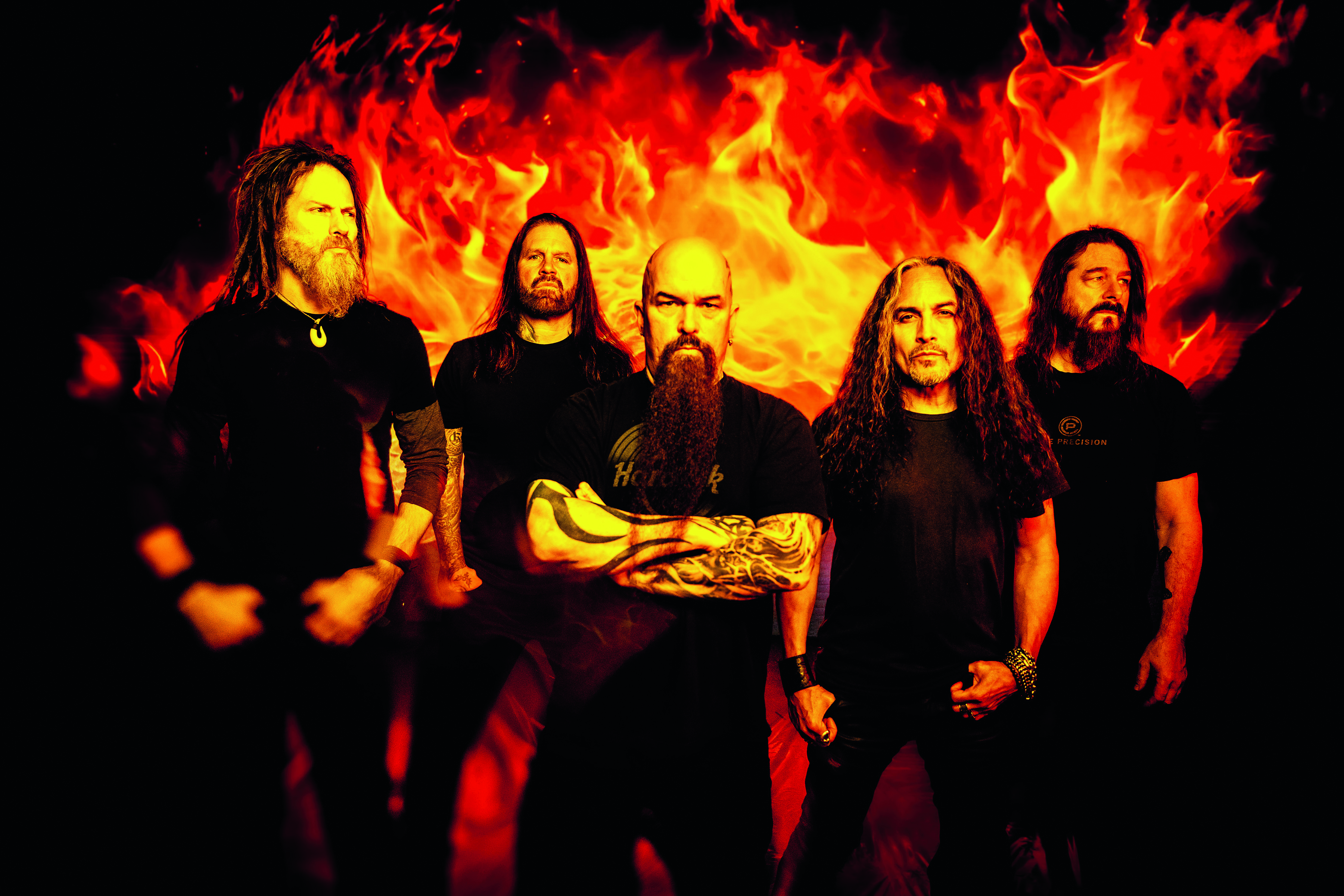
But do you ever find yourself listening to jazz?
“I hit a jazz bar in the city once and want to go more. I was bummed they didn’t have a guitarist that day, as that’s what I was hoping to check out. So I’ll definitely be back. So yeah, I like that stuff, I like classical. Me and my wife hit the opera six or seven times a season and take it all in.”
Two Fists has some almost classic rock-sounding moments.
I do find myself looking at my gear wondering, Why do I have all this stuff?
“I know the part you mean – it sounds like me trying to write a KISS riff! I wanted it to sound like a song from an ’80s punk band. Musically and lyrically, I wanted to convey punk thoughts.
“Punk was a big influence on Slayer. We had the doom from Sabbath, the angst from punk, the polish of Priest and Maiden… take that, throw it into a cocktail shaker and it would spew out Slayer!
“On the song Shrapnel I actually wanted to have the wide-openness of Scorpions’ Animal Magnetism crossed with the beginning of [Slayer classic] Hell Awaits.”
Jeff Hanneman was known for being more on the punk side in Slayer while you were the card-carrying metal maniac. Together you birthed a new sound that would go on to rule the world…
“He’d been listening to metal for so long, he became tired of it. When he played punk to us, I didn’t understand it. After years, it started to click. I realised it was cool in a different way. Things didn’t have to be polished to sound angry and raunchy. As time wore on, I became more of a punk guy than Jeff! It helped lay the groundwork for what we’d go on to become.”
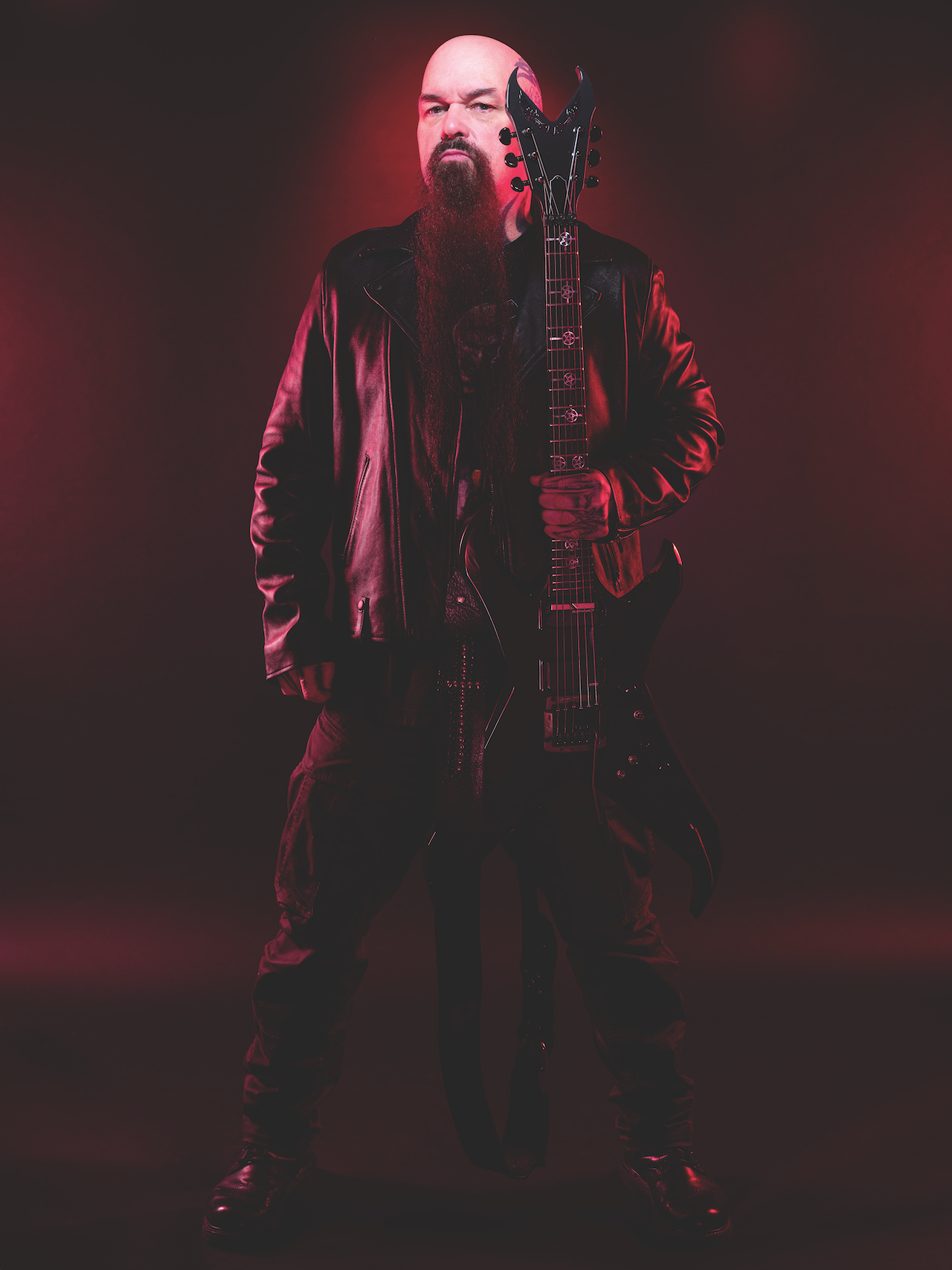
You learned on your dad’s Gibson ES-175. It’s hard to picture you with a jazz box like that!
“I’d forgotten about that! It was a fat Ted Nugent guitar. It was a big guitar for me as a teenager, but looking back now after playing guitar for so many years, it was fun. My dad also had a couple of ES-335s. There was a Tobacco Sunburst one that was nice.
“The ES-175 was in a Blonde finish. It had the f-holes and worked nicely as an acoustic when not plugged in. It was a quality instrument to learn on. Without my dad, who knows what kind of tree trunk I would’ve had.”
Given the amount of gain you use, there’s no chance of you stepping on stage with one of those…
“And that picture would break the internet!”
You also played a Strat in those formative years…
“Yeah, my dad had a 1963 L-Series Strat, which apparently is a big deal. I’m not a big collector, but from what I understand that would be an expensive guitar these days. I played that enough for me realise I was definitely not a single-coil guy. I immediately knew I preferred humbuckers. Even though I love Ritchie Blackmore, single-coils are not for me.
“After that is when I got introduced to the B.C. Rich Mockingbird. Jeff had the B.C. Rich Bich, though he played a black Les Paul on the debut.”
What are the most valuable instruments we’d find in your house, then?
“I’ve still got the Mockingbird in my house. I don’t know if I’ll ever part ways with it, but I do find myself looking at my gear wondering, ‘Why do I have all this stuff?’ Maybe it would be good to make these things available for proper collectors.
“I’ve still got my first V from B.C. Rich and the one-of-a-kind doubleneck V that I used on Spill The Blood [from 1988’s South Of Heaven]. I keep about 10 guitars at home, another 25 in storage and then another 20 in the band storage. And there are more in Hard Rock Cafes and Hotels around the world…”
So you’ve never thought about becoming a serious vintage collector like Joe Bonamassa?
“Knowing me, I’d have too many and spend too much doing it! If there was one special guitar I’d consider, maybe it would be something Ritchie Blackmore played or Judas Priest used. I’d love something like that.”
Well, no-one is expecting to see you with a Tele anytime soon.
“I’ll leave that to John 5. He plays them well!”
- From Hell I Rise is out now on Reigning Phoenix.
Amit has been writing for titles like Total Guitar, MusicRadar and Guitar World for over a decade and counts Richie Kotzen, Guthrie Govan and Jeff Beck among his primary influences as a guitar player. He's worked for magazines like Kerrang!, Metal Hammer, Classic Rock, Prog, Record Collector, Planet Rock, Rhythm and Bass Player, as well as newspapers like Metro and The Independent, interviewing everyone from Ozzy Osbourne and Lemmy to Slash and Jimmy Page, and once even traded solos with a member of Slayer on a track released internationally. As a session guitarist, he's played alongside members of Judas Priest and Uriah Heep in London ensemble Metalworks, as well as handled lead guitars for legends like Glen Matlock (Sex Pistols, The Faces) and Stu Hamm (Steve Vai, Joe Satriani, G3).




